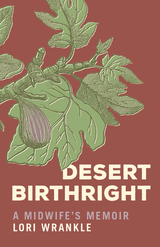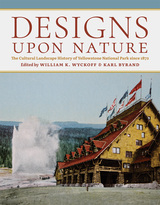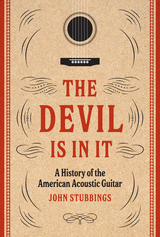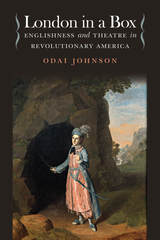
If one went looking for the tipping point in the prelude to the American Revolution, it would not be the destruction of the tea in Boston Harbor, or the blockade of Boston by British warships, or even the gathering of the first Continental Congress; rather, it was the Congress’s decision in late October of 1774 to close the theatres. In this remarkable feat of historical research, Odai Johnson pieces together the surviving fragments of the story of the first professional theatre troupe based in the British North American colonies. In doing so, he tells the story of how colonial elites came to decide they would no longer style themselves British gentlemen, but instead American citizens.
London in a Box chronicles the enterprise of David Douglass, founder and manager of the American Theatre, from the 1750s to the climactic 1770s. The ambitious Scotsman’s business was teaching provincial colonials to dress and behave as genteel British subjects. Through the plays he staged, the scenery and costumes, and the bearing of his actors, he displayed London fashion and London manners. He counted among his patrons the most influential men in America, from British generals and governors to local leaders, including the avid theatre-goers George Washington and Thomas Jefferson. By 1774, Douglass operated a monopoly of theatres in six colonies and the Anglophone Caribbean, from Jamaica to Charleston and northward to New York City. (Boston remained an impregnable redoubt against theatre.)
How he built this network of patrons and theatres and how it all went up in flames as the revolution began is the subject of this witty history. A treat for anyone interested in the world of the American Revolution and an important study for historians of the period.
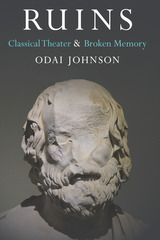
Much of the theater of antiquity is marked by erasures: missing origins, broken genres, fragments of plays, ruins of architecture, absented gods, remains of older practices imperfectly buried and ghosting through the civic productions that replaced them. Ruins: Classical Theater and Broken Memory traces the remains, the remembering, and the forgetting of performance traditions of classical theater. The book argues that it is only when we look back over the accumulation of small evidence over a thousand-year sweep of classical theater that the remarkable and unequaled endurance of the tradition emerges. In the absence of more evidence, Odai Johnson turns instead to the absence itself, pressing its most legible gaps into a narrative about scars, vanishings, erasures, and silence: all the breakages that constitute the ruins of antiquity.
In ten wide-ranging case studies, theater history and performance theory are brought together to examine the texts, artifacts, and icons left behind, reading them in fresh ways to offer an elegantly written, extended meditation on “how the aesthetic of ruins offered a model for an ideal that dislodged and ultimately stood in for the historic.”
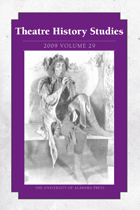
Reimagining the archive, one performance at a time.
Theatre History Studies is a peer-reviewed journal dedicated to excellence in theatre historiography. Volume 29, edited by Rhona Justice-Malloy, includes essays that span a wide range of historical periods, geographic regions, and thematic concerns. Highlights include explorations of pain and torment in performance, the aesthetics of American modernity through Belasco and Jones, and the cultural politics of prohibition on stage. The volume also features visual and archival studies, including an interview with playwright Wendy Wasserstein and analyses of Shakespeare’s reception in Restoration theatre. With contributions from over thirty scholars, this edition offers a rich and multifaceted view of how theatre reflects, resists, and reshapes historical narratives.
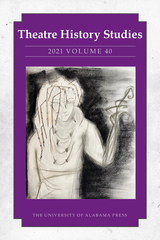
Introduction
—LISA JACKSON-SCHEBETTA, WITH ODAI JOHNSON, CHRYSTYNA DAIL, AND JONATHAN SHANDELL
PART I
STUDIES IN THEATRE HISTORY
Un-Reading Voltaire: The Ghost in the Cupboard of the House of Reason
—ODAI JOHNSON
Caricatured, Marginalized,
and Erased: African American Artists and Philadelphia’s Negro Unit of the FTP, 1936–1939
—JONATHAN SHANDELL
Stop Your Sobbing: White Fragility, Slippery Empathy, and Historical Consciousness in Branden Jacobs-Jenkins’s Appropriate
—SCOTT PROUDFIT
Asia and Alwin Nikolais: Interdisciplinarity, Orientalist Tendencies, and Midcentury American Dance
—ANGELA K. AHLGREN
PART II
WITCH CHARACTERS AND WITCHY PERFORMANCE
Editor’s Introduction to the Special Section
Shifting Shapes: Witch Characters and Witchy Performances
—CHRYSTYNA DAIL
To Wright the Witch: The Case of Joanna Baillie’s Witchcraft
—JANE BARNETTE
Nothing Wicked This Way Comes: Shakespeare’s Subversion of Archetypal Witches in The Winter’s Tale
—JESSICA HOLT
Of Women and Witches: Performing the Female Body in Caryl Churchill’s Vinegar Tom
—MAMATA SENGUPTA
(Un)Limited: The Influence of Mentorship and Father-Daughter Relationships on Elphaba’s Heroine Journey in Wicked
—REBECCA K. HAMMONDS
Immersive Witches: New York City under the Spell of Sleep No More and Then She Fell
—DAVID BISAHA
PART III
Essay from the Conference
The Robert A. Schanke Award-Winning Essay, MATC 2020
New Conventions for a New Generation: High School Musicals and Broadway in the 2010s
—LINDSEY MANTOAN
READERS
Browse our collection.
PUBLISHERS
See BiblioVault's publisher services.
STUDENT SERVICES
Files for college accessibility offices.
UChicago Accessibility Resources
home | accessibility | search | about | contact us
BiblioVault ® 2001 - 2025
The University of Chicago Press



